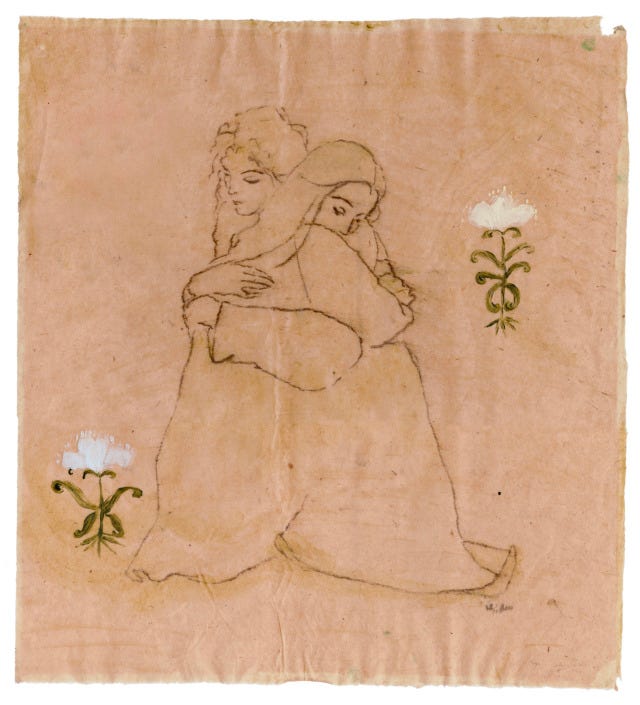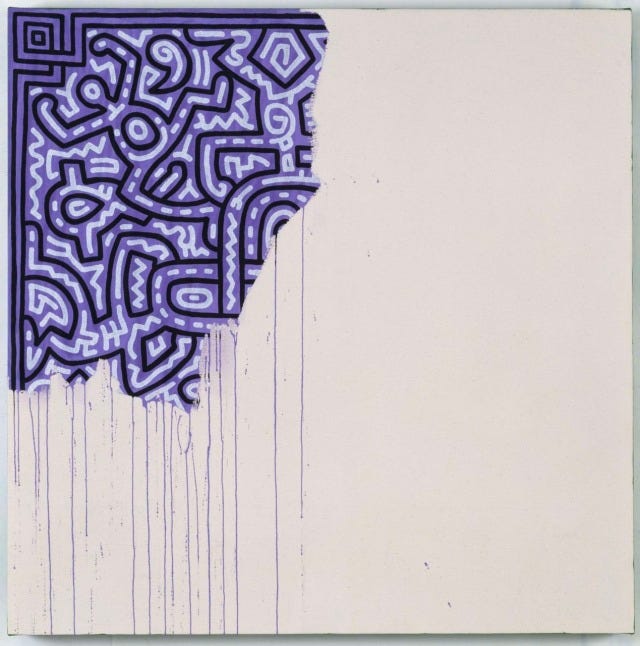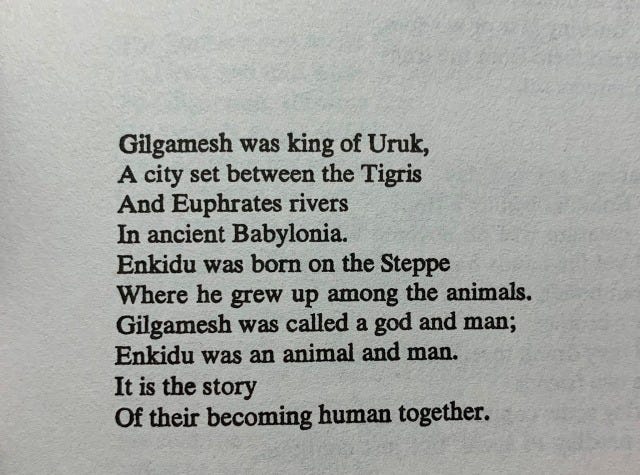are you the Poet or the Poem?
the oldest story we that we have is a simple one. it is our story of becoming human, together.
dear little voice,
we tend to think of our stories as small.
small like secret stones or foraged shells or sharp daggers or precious jewels that can be tucked in the hidden seam of our pockets; kept secret and alive by only the occasional brush of our hand that has reached to make sure they are still there; that they were not imagined. that we did not lose them somewhere along our way. that we have not been forgotten by them.
but there are also our stories which are immense: great soupy stories that howl and thrash at being recollected— and with only a glance can swallow the Heart like a throb.
and then, of course, there are the stories that are not ours to tell: stories that do not belong to us, and never have, but that pass through us all the same: like how wind is always there but we never see it. like how wind remains hidden other than to those who outstretch their arms to hold it.
Girls reading books from mobile library in Levallois-Perret, near Paris, circa 1960.
we are creatures who create our stories in the same fashion that history is built: in some ways intentionally, in others accidentally, and most often intimately and unnoticed.
we are creatures who make history when we put a man in a small boat and send him into the stars, or when we scale a mountain, set off a bomb, write letters, name rivers, or etch eagles into cave walls. but we also make history when someone calls our name, when we turn, allow love to tug at us like a private gravity, when we fall to our knees in the privacy of a field, when we remain silent and when we speak, when we learn to read Latin, when we do not put on our coats, when we are embarrassed by our poems, when we visit a hospital, when we are haunted and when we are cherished and when we are simply known, in moments numbered like stars, orin abacus’ of ache, in these spirals of a life sent out into the air, we live permanently in the wild rise and subtle fade of our own stories.
‘The hug is a petal that envelopes history,’ Zhang Yidan
we are creatures strung together by stories, soothed and surprised again and again by their strands and echos that return to us throughout our lives— in sun, in snow flurries, and in thunderclouds.
and sometimes, little voice, if you are very lucky, you even find a Word with its own story. a Word so necessary that it orchestrated its own delicate human invention:
the word nostalgia has a story that goes like this.
Doctor Hofer was a physician from Mulhouse who created the word nostalgia.
he was trying to give a name to an illness infecting the native Swiss mercenaries, who would spend their days crying, reminiscing endlessly about the ways of their childhoods, the smells of their mothers’ bellies, a glance from a grandfather thirty years ago. when they hung themselves from the branches of trees, it was with the names of their sheepdogs on their lips.
in the face of these soldiers, Hofer scoured his Greek dictionary for the word for return. this word was: nostos— in ancient Greek, the word that means both someone’s return and the story of someone’s return. most often, this return is the story of the Greek hero’s journey home.
he then took from it also the word for suffering: algos.
bringing together nostos (return) and algos (suffering), he created nostalgia: the word we use today in breathless whisper to denote our stories strung out before us, threadbare, distant, and alone. stories like that wind. wind that is always there, while we never see it. untouchable stories always in contact with us.
nostalgia: the melancholic structure of human time. an involuntary confusion: the hallucinatory return of experience, like sudden shards of shattered glass coalescing to render time- for a moment- an unruly kaleidoscope.
there are moments that exist between the stories we tell ourselves: between the note and the music, between the strike and the pain, between the step and the blunder, the kiss and the sigh, the sky and the rain, when the past has not yet been re-built with kindness, and the present has not yet been noticed. moments in which we exist as these strange and beautiful and feathered creatures: heroes rippled and gold and fleeting as the sun we walk toward, returning again and again to the stories we call home; to their soul-pang and their ache and their delight. this is our nostalgia.
Natalie Diaz, “Snake-Light.” Postcolonial Love Poem
there are only two things common to all of our stories, and those are the moments that they end, and the moments that they begin.
every story that has ever been told has begun and ended in silence.
these moments between stories are that silence.
this is because we require silence in order to know that something has just departed, or that something is about to enter and take its place. we need silence in order to know that what is before us is not emptiness, but room— that the presence of anything requires the absence of another. that the survival of your stories are entrusted to their endings.
each syllable prepares, as music, for the next.
and when they end, it is the silence that follows that prepares your breath for pause, that steadies your body, that directs your gaze, calm, amidst histories, toward your next.
but we are creatures that have a great affection for being afflicted; frantically smitten with what we think to be true— creatures who walk about carrying out stories in our fists, afflicted by ourselves, gladly afflicted, gladly needing to be afflicted, gladly walking that long and slow and necessary road that is the hero’s journey.
we are moved deeply when we meet with silence: with the ends of our stories.
it is true, little voice, that a story is written as much in silence as it is in words.
but in this strange tightrope dance between one story and the next, it is the silence between that says: now you can continue this. now it can all be re-told.
in this way, the most beautiful part of the story is where it is going.
if we really believed the beauty to lie only in the parts of the story have already been told, we would linger on the same sentence again and again; moment through moment.
and yet, in our little voices, we read on.
in this way, the most beautiful part of the story is the door.
in this way, the most beautiful part of your life is where you are going.
“Unfinished Painting” — Keith Haring
maybe you have heard, little voice- as i have- that life is passing out difficult questions soon. and that all the stations say they are going to be big.
naturally, you want your answers.
but the answer is in the story— and the story is still being told.
the question, little voice, is this:
are you the poet or the poem?
Sumita Chakraborty, from “Night Questions”
Stories and Histories are of the same word-kin: both rooted in the Ancient Greek historia, meaning: to ask.
we become historians when we become questioners of our stories. and as i have written here before, little voice, it is for this reason that the true questioner is blessed: because they are always unfurling and bursting forward like a gold thread, or a tent of birds. they are constantly in the process of welling up, rising up, surging up; always opening the two edges of the world wider, parting the two lips of the question, always differentiating anew, endlessly, ceaselessly, without boundary or horizon, are always feeling the Moon where their Mouth is.
it is for this reason that the word Poetry is buried in the Greek poesia: to make.
to ask is not an idle thing. it is both an interrogation and a search: a devotion to the intimate, secret centre of the stories you have told yourself: a keeping of faith to truth.
it is a commitment to fashioning all that has happened to you into a path both gentle and dramatic. a path leading you toward what you are, and what you will be.
are you the Poem, or the Poet?
the wonderful story-seeker Hildegard of Bingen answers:
“We cannot live in a world that is interpreted for us by others. An interpreted world is not a home. Part of the terror is to take back our own listening. To use our own voice. To see our own light.”
searching our stories, committing ourselves to them as our histories— as tales worthy of our questioning and our devotion— reveals that anything and everything that has ever happened to you, like any story, is open to creation and debate and transformation— acts that begin to sing the next song that completes the silence that begins it.
your history is not an inarticulate absurdity to be buried, endured, or escaped: it is a vast and serious series of vital, precious, and utterly unrepeatable moments all ushering you— still and cool and pure and true- toward the most very beautiful place you have ever gone: the place that you are going. the stories you are still to write.
so: take up your pen.
“Maybe no poet writes more than one [poem] and it takes a lifetime. He thinks he’s writing different short poems but really they’re all part of the same long one.”
- John Berger, From A to X.
the oldest story the world knows is beautiful, and it goes something like this:
The Epic of Gilgamesh, the oldest surviving literary work in the world.
the oldest story we that we have is a simple one.
it is our story of becoming human, together.
Deacon reads the holy book by candlelight in a rock-hewn church in Gheralta, Tigray (image: Anthony Pappone).
little voice, as you compose the story ahead, like any Poet, you will find meaning where you give meaning.
and when we tell this story you will leave gaps, and these gaps will be filled with Silences: open spaces for truth to emerge.
you will tell many of these stories. none will be the final one.
that is why the most beautiful place your story has is where it’s going; and to get there you must transform a thousand tales you have told before.
“Beauty: lost like a seed, at the mercy of the winds, the storms, not making a sound, often lost, always destroyed; but still it blossoms haphazardly, here, there, fed by shadows, by the funereal earth, welcomed by profundity. Weightless, fragile, almost invisible, apparently without force, exposed, abandoned, surrendered, obedient—it binds itself to what is heavy, immobile; and a flower blooms on the mountainside. […] And so, therefore, one must go on scattering, risking words, lending them exactly the right weight, not giving up until the end—against, always against oneself and the world, until one manages to overcome all opposition through the words themselves—words that transcend boundaries, barriers, that break through, cross over, open and finally triumph, occasionally, in fragrance, in colour—for an instant, only an instant. That, at least, is what I cling to, uttering what is almost nothing…”
the silence before your story accounts for one question only: where are you going?
and it is the longest story we have, and the oldest too: our story of becoming human together.
love,
ars poetica
little voice: it is my belief that Poetry is a human birthright. my work will always be completely free, and takes considerable Time and Love to give to you several days a week. if it has brought you Joy, consider buying me a book so that I may continue to tuck Words in your pocket.














Often I am confused on my identity as a writer of free verse. Do the poems shape me or do I create the poems? It's a universal debate through history of centuries with origins in Greek etymology. I am the Poet as well as the Poem no doubt. It offers great power and responsibility. Hubris has been the downfall of countless artists who assumed they could touch the sun like ancient myths. The door of a story is the one that opens us whole and true. Stories are told with a delicate brush. The wind might seem invisible sometimes like our own memories. Nostalgia is something which buries me in time. I often wander my consciousness in search of something intangible. These words are mine yet they do not belong to me. It's the zen artifacts inside me. Thank you little voices for stretching out these days into years. As we age, the stories become more prominent. Together, us humans will learn to adapt and communicate with more warmth. I feel things too. These journeys are essential to the experiences we all long for. I always gather the lines above and deposit them in a secret reservoir.
oh i am definitely buying you a book.